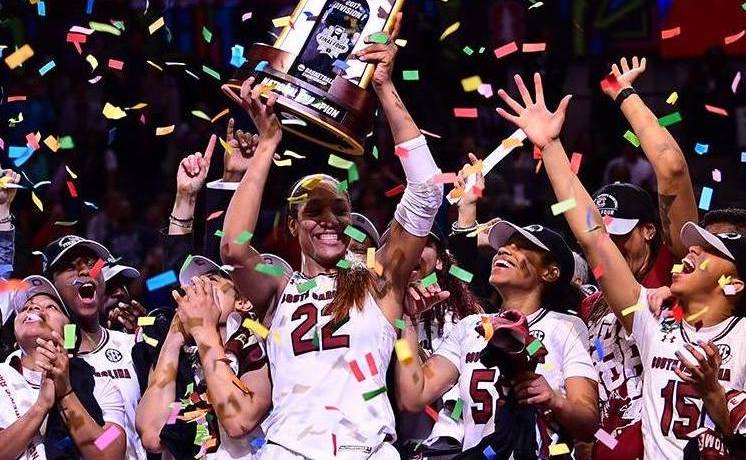How Gail Dent’s Love of Sports Led Her to the NCAA
By John Elsasser
April 2022
Name: Gail Dent
Current job title: Associate Director of Communications, External Affairs, NCAA
Location: Indianapolis
Career highlights: Seeing former interns, mentees and students I worked with having success in their careers. Having the opportunity to travel the world and do public relations on the international front with U.S. Olympic and Paralympic Teams.
Favorite downtime activity: Spending time on a sunny, sandy beach
Favorite place to travel: If not the beach, back home to the Kentucky Derby. There is so much going on that weekend.
Any three dinner guests: Wow, I have a list of so many for this dinner, but aside from my family, these three really inspire me — Harriet Tubman, Muhammad Ali and Ursula Burns.

You didn’t play sports growing up, but you loved watching sports. Where did this love come from?
I used to watch sports with my parents, and really got into football with my dad on NFL Sundays. He would sit in his big chair and put a little chair beside him for me. We’d watch football all day long on two TVs, which is where my love for sports began.
My dad also owned a couple of “every day” thoroughbred racehorses so I was able to go to Churchill Downs early Sunday mornings to watch them train with the jockeys. My dad was really good in tennis and my mom loved sports too, so all of this contributed to my love of sports over the years.
At Eastern Kentucky University, you volunteered for the school’s sports information director and wrote press releases. At this point, were you already interested in communications as a possible career option?
Yes, I actually searched for a college that had a sports administration curriculum, and there were only a handful years ago. Karl Park, who was the longtime sports information director at Eastern Kentucky University, gave me my start and really encouraged me to write, learn, think, question and explore in this field.
So, I had the opportunity to work with coaches, student-athletes and media during college. Then I coupled that experience with work in the university PR office to have a good balance of sports and non-sports communications work.
How did your first job in college sports come about?
I did a cold call after college to an executive working at the NFL offices in New York because I wanted to start my career in pro football. He eventually got back to me and we discussed my work experience, which was limited at that point.
After our chat, he reached out on my behalf to a colleague he had at the University of Kentucky, who had an open position in sports information. UK eventually reached out to me, I interviewed, and the rest is history. The most important thing the NFL rep told me was even though I didn’t have all of the boxes checked on what UK was looking for at that point in my career, that I had enough to get my foot in the door.
What are your main roles and responsibilities at the NCAA?
I have the opportunity to craft messaging from a proactive and reactive perspective and work on communications initiatives with our Inclusion, Education and Community Engagement areas. I also coordinate communication with our corporate sponsor activations, and work with national media on different NCAA issues.
The diversity, equity and inclusion work has really taken off in the last two years, especially in sports and higher education, so it’s a fun challenge to craft messaging, work to explain it and hope that it is interpreted the way in which you want.
Our external affairs group determines who the best voices are to carry NCAA messages and we counsel them on delivery too. Sometimes it is national office staff, student-athletes or our membership in the NCAA. I really enjoy hearing from the athletes as it is always interesting to get their viewpoints on issues and why they vote the way they do in NCAA committee meetings.
How has the role of DE&I evolved at the NCAA in recent years? How are you working with other leaders within the organization to continue to advance DE&I?
We have one of the most proactive Inclusion and Leadership Development departments in sports/higher education. Working with them on communications efforts and DE&I is always interesting because viewpoints are changing and issues are occurring at the campus, national and political levels on a regular basis.
We’re a membership association of over 1,200 colleges, universities and athletics conferences so we are a very diverse association with varying philosophies and voices, which adds to the need for inclusion and the conversations and initiatives that encourage it.
Many don’t realize that we have colleges that are gender specific (all female; all male); we have Historically Black Colleges and Universities; we have military-focused universities; we have religious-based universities; and we have a hearing-impaired university — all that compete in sports in our Association.
So we’re always dealing with our schools and committees on inclusive topics that address race, gender, LGBTQ+, athletes with disabilities and international athletes. We’ve also brought more awareness to significant celebrations, like Juneteenth and various other monthly notables, and we're in the midst of celebrating the 50th anniversary of the federal law, Title IX, which prohibits gender discrimination.
In addition, we continue to have conversations around social activism — because that remains a key topic — and around inclusive leadership when it comes to hiring practices in sports. Student-athletes are also more vocal today on topics that are of interest to them so that presents some interesting scenarios too.
Last fall, the NCAA announced that it would advertise and brand Division I Women’s Basketball as part of March Madness for the first time. What other steps do you think will help improve gender equity between men’s and women’s sports?
We have to keep talking, brainstorming and being strategic, and then we have to put what we learn into action. Everyone knows March Madness so both NCAA men’s and women’s basketball programs rebranded and utilized it this year.
To keep things improving on sports equity overall, we have to have diverse minds at the table to keep our ideas fresh. Sometimes you recreate the wheel and then sometimes you take the wheel and make some revisions because the same success can be achieved, but with added resources. We can empower and create opportunities for success and growth on the women’s side in many sports, and we have reviewed and made some significant changes in our operations.
We can move it forward and look at where equity is not occurring and change it. We can incentivize to make it happen faster, if needed. We need to work together, and women and men need to talk more too. Remember, supporters and even mentors don’t have to be the same gender or race. Avoiding stereotypes saves us time and opens more doors. And let’s also be diverse with our gender initiatives.
Even though we may be a force of women in our work, everyone at the table doesn’t have to look the same. Let’s make sure diversity is happening in our women’s circles too. Practice it and then do what needs to be done. It doesn’t happen overnight, but actions speak loudly. If you can be successful promoting on the men’s side, you can certainly do the same on the women’s side. Sports allows you that creativity. We need more equity across the board with gender and race.
You've said that there weren't many women — especially women of color — as you were starting out in your career. As a role model now, what advice do you have for new professionals entering the sports industry?
Yes, women of color in communications and sports are still fighting a few battles. People categorize us in race only, and sometimes forget about our perspectives in gender discussions. We live a few different experiences which brings something unique to the management table, but sometimes we get left out of conversations.
So I tell students and those entering the industry to be open minded and seek different viewpoints. New professionals need to be able to forecast outcomes based on management decisions. If we do this, then this will likely occur. Some of that comes with life experiences, some comes simply with good judgement.
You should be nimble in sports and communications because you’re dealing with different personalities and issues, and matters can change very quickly. You need to be able to handle diversity and change too, or hire the ones who can handle it. That’s part of the reason we’re seeing so much movement around DE&I in the workforce today because it can impact your business.
The world is going to continue evolving and becoming more diverse. And we know that sometimes the plan you start with in a game gets changed a bit at halftime or midway in order to get the win at the end. The individuals who can adapt to change and keep moving forward will be ripe for success, that’s related to DE&I or simply business in general. If everyone-or your majority-is pushing in the same direction, you will reach your sports or business goals much sooner.



